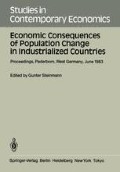Abstract
The past fifteen years have seen the emergence or the re-emergence (Serow, 1975) of concern with the economic consequences of the demographic and social changes implicit in what appear to be more or less permanent changes in the demographic behavior of citizens of industrialized nations. Paramount among these is the sustained levels of low fertility in all such nations (see Serow, 1981 for additional evidence of this) which, coupled with decreases in mortality, have led to substantial aging both over the recent past and into the foreseeable future. This aging has also been accompanied by other behavioral changes — increased divorce and delayed/foregone marriage — all of which have increased the number of households relative to the size of population in industrialized nations.
Access this chapter
Tax calculation will be finalised at checkout
Purchases are for personal use only
Preview
Unable to display preview. Download preview PDF.
References
Cogdon, P. (1980), Forecasting births in greater London, in: Population Studies, vol. 34.
Denton, F./Spencer, B. (1975), Population and the Economy, Farnborough: Saxon House.
Denton, F./Spencer, B. (1983), Macroeconomic Aspects of the Transition to Zero Population Growth, in: C. Garbacz (ed.), Economic Resources for the Elderly, Boulder: Westview.
Easterlin, R. (1975), Relative Economic Status and the American Fertility Swing, in: E. Sheldon (ed.), Family Economic Behavior, Philadelphia: Lippincott.
Eilenstine, D./Cunningham, J. (1972), Projected Consumption Demandsfor a Stationary Population, in: Population Studies, vol. 26.
Espenshade, T. (1978), How the Trend Towards a Stationary Population Affects Consumer Behavior, in: Population Studies, vol. 32.
Friedlander, D./Klinov-Malul, R. (1980), Aging of Populations, Depen-dency and Economic Burden in Developed Countries, in: Canadian Studies in Population, vol. 7.
Keyfitz, N. (1971), On the Momentum of Population Growth, in: Demography, vol. 8.
Lapkoff, S. (1983), Pay-as-you-go Retirement Plans in Nonstable popula-tions. Paper presented at the annual meeting of the Population Association of America.
LeBras, H./Tapinos, G. (1979), Perspectives a Long Terme de la Population Francaise et Leurs Implications Economiques, in: Population, vol. 34.
Lee, R. (1976), Demographic Forecasting and the Easterlin Hypothesis, in: Population and Development Review, vol. 2.
Lesthaeghe, R./Despontin, M./Page, H./Wijewickrema, S. (1979), Oscillating Fertility:Amplifying and Dampening Mechanisms, in: Proceedings of the Conference on Economic and Demographic Change, Liege: IUSSP.
Musgrove, P. (1982), U.S. Household Consumption, Income and Demographic Changes: 1975–2025, Washington: Resources for the Future.
Ogawa, N. (1982), Economic Implications of Japan’s Ageing Population, in: International Labour Review, vol. 121.
Serow, W. (1975), The Economics of Stationary and Declining Populations, in: J. Spengler (ed.), Zero Population Growth: Implications, Chapel Hill: Carolina Population Center.
Serow, W. (1981), Socio-Economic Implications of Changing Age Composition of Low Fertility Countries, in: Solicited Papers: International Population Conference, vol. 3, Liege: IUSSP.
Serow, W. (1982), On Demographic Aging, Inflation and Real Wages, in: Atlantic Economic Journal, vol. 10.
Serow, W./Espenshade, T. (1978), The Economics of Declining Population Growth, in: T. Espenshade and W. Serow (eds.), The Economic Consequences of Slowing Population Growth, New York: Academic Press.
Siegel, J. (1980), On the Demography of Aging, in: Demography, vol. 17.
Simon, J. (1977), The Economicsof Population Growth, Princeton: Princeton University Press.
Simon, J. (1983), The Present Value of Population Growth in the Western World, in: Population Studies, vol. 37.
Spengler, J. (1972), Prospective Population Change and Price Level Tendencies, in: Southern Economic Journal, vol. 38.
Spengler, J. (1978), Facing Zero Population Growth, Durham: Duke University Press.
Wachter, M. (1975), A Time Series Fertility Equation, in: International Economic Review, vol. 32.
Wander, H. (1978), ZPG Now: The Lessons from Europe, in: T. Espenshade and W. Serow (eds.), The Economic Consequences of Slowing Population Growth, New York: Academic Press.
Author information
Authors and Affiliations
Editor information
Editors and Affiliations
Rights and permissions
Copyright information
© 1984 Springer-Verlag Berlin Heidelberg
About this paper
Cite this paper
Serow, W.J. (1984). The Impact of Population Change on Consumption. In: Steinmann, G. (eds) Economic Consequences of Population Change in Industrialized Countries. Studies in Contemporary Economics, vol 8. Springer, Berlin, Heidelberg. https://doi.org/10.1007/978-3-642-86478-0_10
Download citation
DOI: https://doi.org/10.1007/978-3-642-86478-0_10
Publisher Name: Springer, Berlin, Heidelberg
Print ISBN: 978-3-540-13513-5
Online ISBN: 978-3-642-86478-0
eBook Packages: Springer Book Archive

